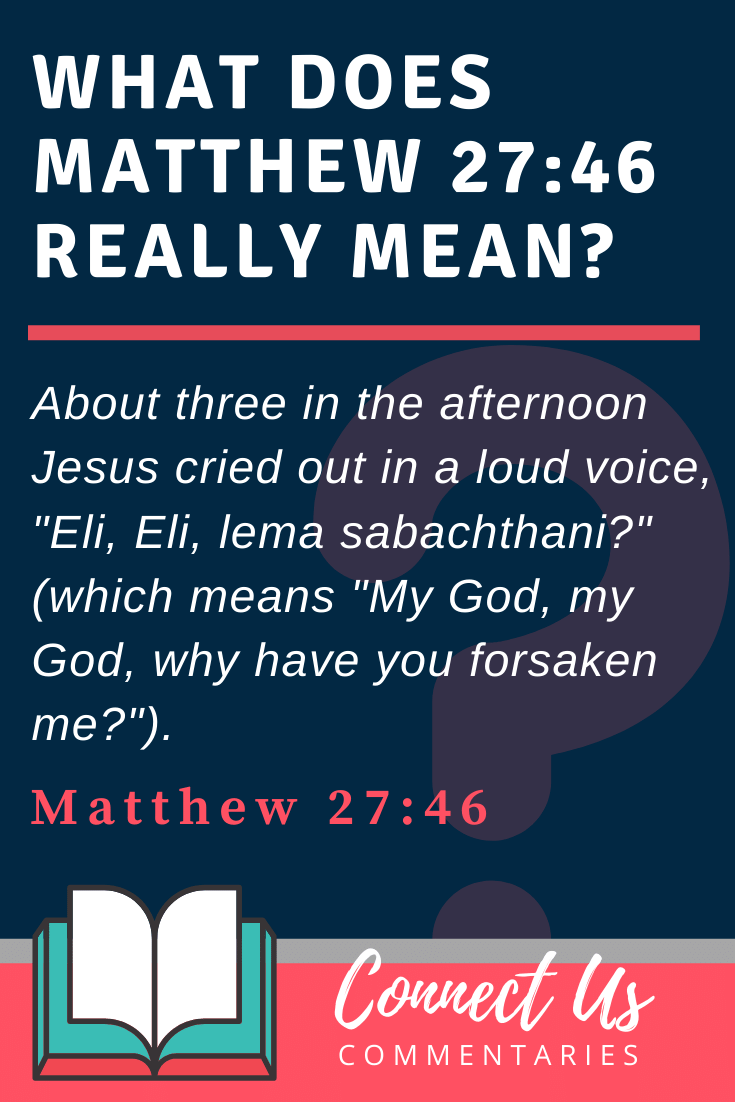Matthew 27:46
“About three in the afternoon Jesus cried out in a loud voice, ‘Eli, Eli, lema sabachthani?’ (which means ‘My God, my God, why have you forsaken me?’).”
Explanation and Commentary of Matthew 27:46
Though this has puzzled believers for two millennia, Jesus’s words from the cross are not too hard to understand. During much of his time on the cross, he has seemed to have in mind the 22nd Psalm, which seems in part to be lived out by Christ up to and on the cross. “7 All who see me mock me; they hurl insults, shaking their heads. 8 “He trusts in the Lord,” they say, “let the Lord rescue him. Let him deliver him, since he delights in him.” It seems that the quote falls in line with the brutality of the situation and makes sense in light of the rest of the Psalm. Consider that verses 3-5 say, “3 Yet you are enthroned as the Holy One; you are the one Israel praises. 4 In you our ancestors put their trust; they trusted and you delivered them. 5 To you they cried out and were saved; in you they trusted and were not put to shame.”
The account of Jesus’ life, death, and resurrection in the Gospels prove without a doubt that Jesus was not unclear as to the reason for his suffering, or for God’s temporary “forsaking” of him when he hung on a cross, full of the sins of the world, and the wrath of God for those sins. That Jesus cries out here in this way is more a testament to his value of the Psalms as an honest way to pray in any situation. The truth was that God had indeed forsaken him because he was paying the penalty for our sins. Jesus did not want to do this, as shown by his prayers in Gethsemane (Mt 26:36-56), but that he was willing was also evident. He did it for the “joy set before him,” (Heb 12:2). But it was torture, and he was temporarily forsaken by God, after which he was vindicated and exalted.
Breaking Down the Key Parts of Matthew 27:46
#1 “About three in the afternoon…”
Christ was tortured so badly that, “his appearance was so disfigured beyond that of any human being and his form marred beyond human likeness—“ (Isa 52:14). Consequently, he spent less time than most alive on his cross. He died relatively quickly and did not have to have his legs broken to hasten the process (Jn 19:32).
#2 “Jesus cried out in a loud voice,”
One possible proof that Jesus had not suddenly become confused at what was happening to him is that this was cried in a loud voice. This indicates a distinct possibility that he wanted to be heard by those watching. That it is recorded means that God wanted it to be heard for our benefit.
#3 “‘Eli, Eli, lema sabachthani?’ (which means ‘My God, my God, why have you forsaken me?’).”
A quote of Psalm 22:1, which is followed by an addition of trust in God and his plan (Ps 22:3-5).
Expert Overview of Matthew Ch. 14-28
Biblical Translations of Matthew 27:46
NIV
About three in the afternoon Jesus cried out in a loud voice, “Eli, Eli, lema sabachthani?” (which means “My God, my God, why have you forsaken me?”).
NLT
At about three o’clock, Jesus called out with a loud voice, “Eli, Eli, lema sabachthani?” which means “My God, my God, why have you abandoned me?”
ESV
And about the ninth hour Jesus cried out with a loud voice, saying, “Eli, Eli, lema sabachthani?” that is, “My God, my God, why have you forsaken me?”
KJV
And about the ninth hour Jesus cried with a loud voice, saying, “Eli, Eli, lama sabachthani?” that is to say, “My God, my God, why hast thou forsaken me?”
NKJV
And about the ninth hour Jesus cried out with a loud voice, saying, “Eli, Eli, lama sabachthani?” that is, “My God, My God, why have You forsaken Me?”

Natalie Regoli is a child of God, devoted wife, and mother of two boys. She has a Master's Degree in Law from The University of Texas. Natalie has been published in several national journals and has been practicing law for 18 years.